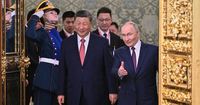On May 8, 2025, Russian President Vladimir Putin and Chinese President Xi Jinping met in Moscow to celebrate their countries' deepening ties, vowing to enhance cooperation in various sectors, including military collaboration. This meeting coincided with the eve of celebrations marking the 80th anniversary of the Soviet victory over Nazi Germany in World War II, a historical moment that both leaders used to emphasize their united front against perceived Western aggression.
In a joint statement released after their talks, Putin and Xi declared their intention to "strengthen coordination in order to decisively counter Washington's course of 'dual containment' of Russia and China." This phrase reflects their mutual concern regarding U.S. policies that they believe seek to isolate and undermine their nations. They further disavowed any attempts by third countries to promote hostility toward their partnership, asserting that they would work together to promote peace in Ukraine while addressing the war's "root causes." This language echoes Russia's longstanding narrative that it was compelled to invade Ukraine due to NATO's expansion.
The backdrop of this meeting is significant, as China has emerged as a key ally for Russia since the latter's full-scale invasion of Ukraine in 2022. Beijing has become Moscow's primary supplier of dual-use goods, which are vital for Russia's defense industry. Notably, Ukrainian President Volodymyr Zelensky claimed on April 17, 2025, that China is providing weapons to the Russian military, marking the first acknowledgment from Kyiv that Beijing is actively supporting Moscow's war efforts.
During the meeting, Xi expressed his satisfaction in participating in the Victory Day celebrations, stating that "China and Russia are ready to defend the truth about the history of World War II." This statement underscores the narrative both leaders wish to project: that they are not only allies in the present but also custodians of historical truths that they believe are under threat from Western perspectives.
The Chinese president's visit to Russia is expected to last until May 10, 2025, during which time the two nations will engage in various discussions. Kremlin spokesman Dmitry Peskov indicated that these talks would include both one-on-one meetings between the leaders and broader discussions involving delegations from both countries.
Putin used the occasion to express his desire to visit China again officially, emphasizing the ongoing efforts to strengthen bilateral relations. This sentiment is particularly poignant given the current geopolitical climate, where both nations find themselves increasingly reliant on each other as they navigate tensions with the West.
The ongoing conflict in Ukraine has further complicated U.S.-Russia relations, with President Donald Trump expressing frustration over the lack of progress in negotiations to end the war. On April 26, Trump suggested that Putin might be "tapping me along" in talks, and on May 8, U.S. Vice President JD Vance stated that the U.S. would be prepared to "walk away" from negotiations if no progress was made.
As Putin and Xi reaffirmed their partnership, they also took the opportunity to cast themselves as defenders of a multipolar world order. They condemned what they described as unilateralism and bullying from powerful nations, particularly targeting U.S. policies that they argue destabilize international relations.
In a further display of their cooperation, the two leaders announced the signing of more than 20 agreements aimed at deepening their strategic partnership. These agreements span various sectors, including economic, military, and technological cooperation. Notably, they included a joint memorandum between the Russian and Chinese space agencies focusing on the construction of a power plant on the moon, which is part of their broader ambitions for space exploration.
Xi's remarks during the meeting emphasized the need for China and Russia to be "true friends of steel that have been through a hundred trials by fire," reinforcing the idea that their partnership is not only strategic but also deeply rooted in shared historical experiences.
As the military parade in Red Square approaches, it is expected that over 25 world leaders, including those from authoritarian regimes such as Venezuela, Cuba, and Belarus, will attend, highlighting the Kremlin's efforts to showcase its international alliances amid growing isolation from the West.
This gathering of leaders from countries often viewed as adversaries to U.S. interests reflects a significant shift in global dynamics, with Russia's reliance on China becoming more pronounced as it seeks to counter Western sanctions and diplomatic pressures. The leaders' joint statement also included a pointed critique of U.S. plans for a "Golden Dome" missile defense system, which they labeled as "deeply destabilizing" and indicative of a broader trend towards militarization in international relations.
Putin's invocation of World War II history is particularly poignant, given that the Soviet Union lost approximately 27 million people during the conflict. This historical narrative has been leveraged by the Kremlin to galvanize public support for its military actions in Ukraine, framing them as a necessary fight against modern manifestations of fascism.
As both leaders navigate their respective challenges—Putin with the ongoing conflict in Ukraine and Xi with pressures from the U.S.—their partnership appears to be more crucial than ever. The meeting on May 8 serves not only as a reaffirmation of their alliance but also as a strategic maneuver in a rapidly changing geopolitical landscape.
In summary, the meeting between Putin and Xi on May 8, 2025, marks a significant moment in the evolving relationship between Russia and China. Their joint commitment to countering U.S. influence and strengthening bilateral ties is set against a backdrop of historical remembrance and contemporary geopolitical tensions, highlighting the complexities of global diplomacy in the 21st century.

